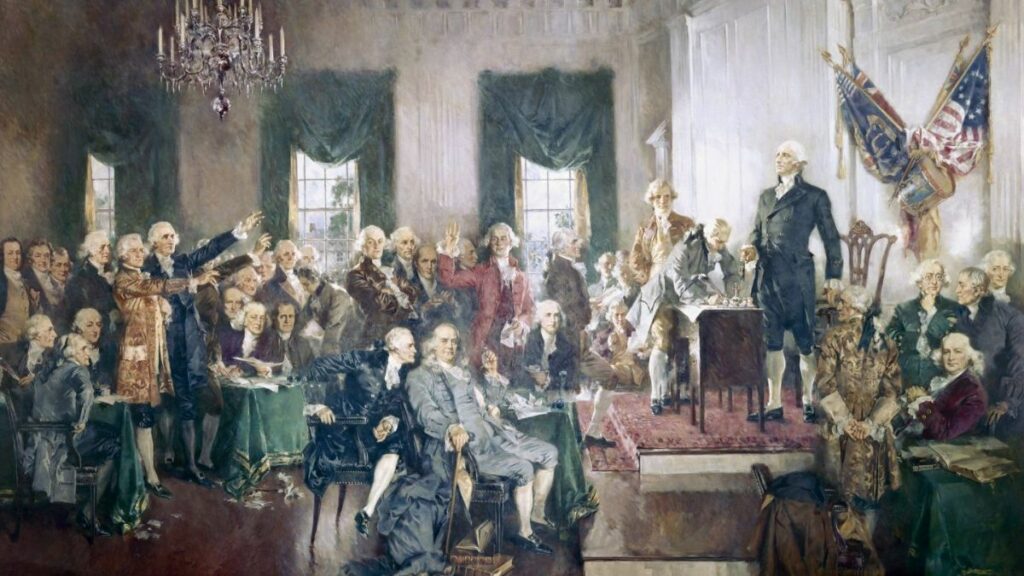With America in a state of discord not unlike that described by Dickens in A Tale of Two Cities—“It was the best of times, it was the worst of times, it was the age of wisdom, it was the age of foolishness…”—some are calling for radical change.
“Torch the Constitution” urged Harvard Professor Louis Menand, writing in The New Yorker less than a week after Constitution Day on September 17, 2024. The Founders “failed,” claims Menand, and so will we if we do not abandon the Constitution they gave us. Several days later, as reported by Mediaite, author Fran Lebowitz “torched the Supreme Court” in a televised interview by calling on President Biden to “dissolve” it.
Besides the irony of seeking to destroy the very bastion that guarantees to these individuals the right to express their opinions, such demands turn a blind eye to the fact that not only did British Prime Minister William Gladstone call the Constitution “the most wonderful work ever struck off at a given time by the brain and purpose of man,” but the drafters themselves insisted it was produced by more than human ingenuity.
Connecticut delegate William Samuel Johnson, who served as chairman of the Committee of Style that drafted the final version, said of the outcome, “I cannot but impute it to a signal intervention of divine providence.”
South Carolina delegate Charles Pinckney, later governor of the state and a U.S. senator, admitted to being “struck with amazement” at the same “super-intending hand of Providence that so miraculously carried us through the war.”
Perhaps the most impressive witness came from the document’s principal architect, Virginia delegate James Madison: “It is impossible for the man of pious reflection not to perceive in it a finger of that Almighty hand which has been so frequently and signally extended to our relief in the critical stages of the revolution,” and “impossible to consider the degree of concord which ultimately prevailed as less than a miracle.”
According to Professor Matthew Spalding, the Constitutional Convention was “one of the greatest events in the history of human liberty,” producing “the most enduring, successful, enviable, and imitated constitution man has ever known.” The key, says Spalding, is its basis in the “permanent truths about man, politics, and liberty” already articulated in the Declaration of Independence. Thus the Constitution does not presume to grant the blessings of liberty—these are bestowed by the Creator Himself—but to secure them. It was a revolution like no other.
What is truly revolutionary about America is that, for the first time in human history, these universal ideas became the foundation of a particular system of government and its political culture…. To this day, so many years [later], these principles… still define us as a nation and inspire us as a people. They are responsible for a prosperous and just nation unlike any in the world. They are the highest achievements of our tradition, serving not only as a powerful beacon to those throughout the world who strive for freedom and seek to vindicate self-government but also a warning to tyrants and despots everywhere. It is because of these principles, not despite them, that America has achieved its greatness.
To those who would abandon the Constitution, Spalding declares,
We don’t need to remake America, or discover new and untested principles. The change we need is not the rejection of America’s principles but a great renewal of these permanent truths about man, politics, and liberty… as a source of assurance and direction for our times.
If the radical demands of Menand and Leibowitz were isolated voices, Spalding’s answer may suffice. But those demands are part of a larger chorus to which we all must respond by exercising our God-given and Constitution-secured right to speak out. Well has Mark Levin urged,
The counterrevolution to the American Revolution is in full force… It is devouring our society and culture, swirling around our everyday lives, and ubiquitous in our politics, schools, media, and entertainment….. We must rise to the challenge, as did our Founding Fathers…. President Ronald Reagan’s fateful and prescient observation… compels our attention: “Freedom is never more than one generation away from extinction. We didn’t pass it to our children in the bloodstream. It must be fought for, protected, and handed on for them to do the same, or one day we will spend our sunset years telling our children and children’s children what it was once like in the United States where men were free.”
